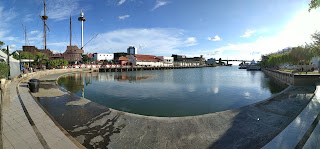GHOST HUNTING
Google Image
Ghosts are big business. For entities that may or may not exist, they seem to be everywhere, especially during Halloween.
They are in books and on television shows, such as CBS's "The Ghost Whisperer" and NBC's "Medium." Dozens of "ghost hunter" organizations exist across North America, small groups of self-styled ghost buffs who lurk around reputedly haunted places, hoping to glimpse or photograph a spirit.
The most famous ghost hunters are two plumbers who moonlight as paranormal investigators, seen in the popular Sci-Fi Channel reality show/soap opera series "Ghost Hunters." They go to haunted places and find "evidence" of ghosts such as cold spots, photographic anomalies called orbs, and other such spookiness.
The two featured investigators, Jason Hawes and Grant Wilson, are proudly blue-collar workers, not egghead Ph.D. scientists, which adds to their strong "regular guy" appeal.
While one doesn't need to be a scientist to search for ghosts, the pair (like most ghost hunters) could benefit greatly from a little critical thinking. They claim to be skeptics but are very credulous and seem to have no real understanding of scientific methods or real investigation. (Audiences don't seem to wonder why these "expert" ghost hunters always fail: Even after two seasons and over ten years of research, they still have yet to prove that ghosts exist!)
Though most ghost investigators' worst crime is wasting time, sometimes they make nuisances of themselves and even break the law.
Google Image
In October 2005, three ghost hunters in Salem, Massachusetts, were arrested for trespassing on private property in search of ghosts. They had entered an abandoned hospital reputed to be haunted. The group was so busy looking for spirits they failed to notice the police station across the street; all three were arrested, fined, and sent home. Trespassing or vandalizing ghost hunters have also been arrested in cemeteries in Illinois, Connecticut, and other states.
Ghost detectors
When it comes to searching for ghosts, you'd think that only the most reliable methods would be used in an attempt to get solid evidence for something as mysterious and elusive as a spirit. Yet in ghost hunting, often the less scientific the methods and equipment, the more likely a researcher is to find "evidence" for ghosts.
Ghost hunters use a variety of creative—and dubious—methods to detect their quarry's presence, including psychics. Psychics not only claim to locate ghosts but also to communicate with the spirits, who unfortunately don't provide any useful or verifiable information from the afterlife [see a séance].
Virtually all ghost hunter groups claim to be scientific, and most give that appearance because they use high-tech scientific equipment such as Geiger counters, Electromagnetic Field (EMF) detectors, ion detectors, and infrared cameras [and sensitive microphones]. Yet the equipment is only as scientific as the person using it; you may own the world's most sophisticated thermometer, but if you are using it as a barometer, your measurements are worthless.
Just as using a calculator doesn't make you a mathematician, using a scientific instrument doesn't make you a scientist.
Google Image
Uncomfortable reality
The uncomfortable reality that ghost hunters carefully avoid—the elephant in the tiny, haunted room—is of course that no one has ever shown that any of this equipment actually detects ghosts.
The supposed links between ghosts and electromagnetic fields, low temperatures, radiation, odd photographic images, and so on are based on nothing more than guesses, unproven theories, and wild conjecture. If a device could reliably determine the presence or absence of ghosts, then by definition, ghosts would be proven to exist. The most important tools in this or any investigation are a questioning mind and a solid understanding of scientific principles.
The ghost hunters' anti-scientific illogic is clear: if one area of a home is colder than another, that may indicate a ghost; if an EMF meter detects a field, that too may be a ghost; if dowsing rods cross, that might be a ghost. Just about any "anomaly," anything that anyone considers odd for any reason, from an undetermined sound to a "bad feeling" to a blurry photo, can be (and has been) considered evidence of ghosts.
Reality check
The whole idea of ghosts runs into trouble as soon as a little logic is applied.
There's not even agreement on what ghosts are—or might be. A common claim is that ghosts are spirits of the dead who have been wronged or murdered. Let's inject some real-world statistics into that assumption and see what we get.
Google Image






Comments
Post a Comment